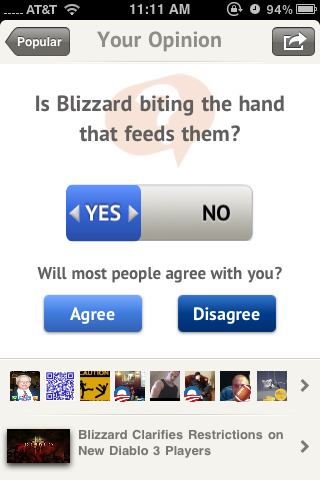

Scoople is a polling company that acts like a media aggregator but operates as a game. But you wouldn’t necessarily know that if you’ve been spending time with the newish app, which gives users points for answering questions about news stories, and predicting other users’ answers.
Here’s how it works: Scoople uses a “content engine” to aggregate from a variety of sources and produce a single story. The machine tracks some 200 RSS feeds, but a story is often a partial mash-up of just two articles, which Scoople cites with links to the originals. Scoople publishes content by category in channels like Celebrity, Film, Politics, Tech, World, Gaming, and so on. Part-time editorial staffers come up with questions that go with each story.
So, let’s say it’s a piece about the Philadelphia Eagles.
The question might be: Will Philly ever win a Super Bowl? [No. —Ed.] If I’m a Scoople user, I answer the question (2013 all the way!) then guess whether most other readers answered the same way. Questions remain open for a period of hours, and collective answers are revealed after the time expires. (Here’s an example from the Scoople blog.)
As players accrue points, they work their way up the Scoople leaderboard. The company also has launched a virtual store where players can spend “Scoople bucks” they earn by playing. For now, they can use bucks to decorate their profile pages. That could lead to a system where bucks could be redeemed and used for subscriptions to online news sites, according to Alain Mayer, co-founder and CEO of Dygest, the company that made Scoople.

I asked Mayer if he feels compelled to give back to news organizations that produce the content Scoople aggregates. Does he feel like he owes them something? Not really. Mayer calls the dynamic “a give and take,” saying that Scoople is careful to lift only small sections from each story, and that the game actually drives up traffic to the news sites by linking to the original content. Scoople isn’t a media company but rather a “social network around news,” he says.
“Foursquare is a social network around location, a social experience around location,” Mayer said. “In very similar ways, we have created a social experience around media content…They’re not building a fantasy farm. It’s very well-grounded in daily news, daily events that they already think about.”
Like other social networks, Scoople sees potential value in the information that people share about themselves. Instead of paying money to participate, players dole out opinions and demographic data that can then be mined. In other words: Scoople provides a game-like experience, but that doesn’t actually make it a game. At its core, Scoople is actually a polling company, or at least that’s what Mayer intends for it.
“Not only do we have demographics, we have the opnion profile,” Mayer said. “So as we grow the user base, and as we grow over time, we grow the opinion profile. We can make very interesting correlations. That’s going to be the core of the company as we move forward; the data.”
Mayer won’t get specific about the number of people playing, but he says Scoople has collected “well over a quarter-million opinions,” with the average user’s opinion profile consisting of 50 responses. For now, the company is sharing some of the data it’s gathering on its website. Down the road, the idea is to charge third parties for access to that data.
Mayer says he could also introduce sponsored questions for another revenue stream. The example he gives is that Nike might want to ask Scoople players who spend a lot of time reading the sports channel about their sneaker style preferences. (It seems like a strategy that could also encourage advocacy-oriented questions. For example, a political campaign could sponsor a question that casts its candidate in a positive light and have that question appear after a story that raises questions about his or her opponent.)
An exchange of personal data is already at the heart of social networks like Facebook, and that makes plenty of people uneasy. But collecting user data also represents revenue opportunities for news organizations, which must navigate a fine line between preserving public trust and potentially infringing on individuals’ privacy. The tremendous value of social readers, for example, isn’t just the traffic boost that news organizations get. The ability to know who readers are, and who they’re connected to, is huge. Scoople takes this concept and adds a mechanism to track what people think, as well as how opinions change over time.
“The speed and scale of how news distribution works today is unprecedented,” Mayer said. “On the other hand, you have opinion research and opinion polling companies that operate the same way that they did 10 or 20 years ago, calling you up and asking your opinion without any context. We felt, let’s start to merge these worlds.”
Photo by secretlondon123 used under a Creative Commons license.